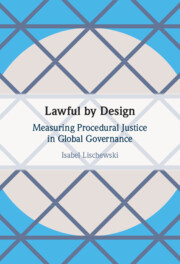3 - Analyzing the Data
Published online by Cambridge University Press: 13 January 2022
Summary
It is shown that the form of an institution, its legal character, and membership do not determine procedural density.
The finding that the procedural density regarding an activity is zero is very prevalent in the sample. The reasons for this usually lie in low state interest, which is demonstrated via case studies of the European Advertising Standards Alliance and the Proliferation Security Initiative.
During coding, there were certain procedural steps which occurred more frequently than others but no distinct patterns of combinations of procedural steps. This leads me to assume that procedure as a design element is valued for its variety and flexibility.
Whether an activity is hard or soft law or somewhere in between greatly determines state interest in procedural justice. This is further explored via a case study of the Human Development Index.
Like the legal character, the exact characteristics of an administrative activity affect procedural density. This is illustrated using the different branches of the International Telecommunications Union and their procedure.
Of the different kinds of procedural steps, review is by far the least prevalent because it strongly affects state interests and often juxtaposes them with individual rights and interests. This is illustrated with comparative case studies of the Interpol Commission for the Control of Files and the ICANN Independent Review Procedure.
Procedural justice in the shape of procedural steps is a more flexible design tool than an institution's different organs. All things being equal, it is therefore preferred. This is demonstrated by the decentralized compliance monitoring mechanism used by the International Electrotechnical Commission.
The main findings from the empirical research are summarized.
Keywords
Information
- Type
- Chapter
- Information
- Lawful by DesignMeasuring Procedural Justice in Global Governance, pp. 63 - 156Publisher: Cambridge University PressPrint publication year: 2022
